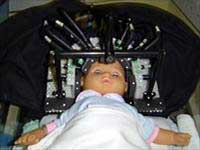 Scientists at the University of London, UK, are developing a handheld brain scanner designed to treat and save the lives of premature and newborn infants.
Scientists at the University of London, UK, are developing a handheld brain scanner designed to treat and save the lives of premature and newborn infants.
The MONSTIR scanner will help avoid the need to transport critically ill children to conventional medical facilities equipped with traditional scanners. This process often involves administering sedatives, which can pose additional risks to the children.
The data provided by the scanner can be used to diagnose and assess various issues, such as brain hemorrhages. It also assists doctors in determining the best possible treatment options.
MONSTIR operates using a technique called optical imaging to create images that show how the brain is functioning. Light is passed through body tissues and then analyzed by a computer. A cap fitted with 32 light sensors and 32 low-intensity laser light sources is placed over the infant’s head.
Software utilizes this information to generate three-dimensional images. These images can reveal areas of the brain that are receiving oxygen, where blood is flowing, and evidence of brain injury.
Q.HƯƠNG


















































